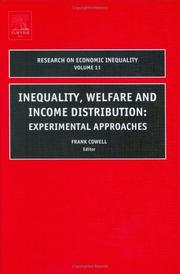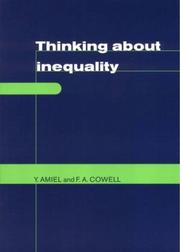| Listing 1 - 3 of 3 |
Sort by
|
Book
ISBN: 9780199594047 9780199594030 0199594031 019959404X 9786613348425 0191625124 0191808652 128334842X 0191613061 9780191613067 Year: 2011 Publisher: Oxford ; New York : Oxford University Press,
Abstract | Keywords | Export | Availability | Bookmark
 Loading...
Loading...Choose an application
- Reference Manager
- EndNote
- RefWorks (Direct export to RefWorks)
What do we mean by inequality comparisons? If the rich just get richer and the poor get poorer, the answer might seem easy. But what if the income distribution changes in a complicated way? Can we use mathematical or statistical techniques to simplify the comparison problem in a way that has economic meaning? What does it mean to measure inequality? Is it similar to National Income? Or a price index? Is it enough just to work out the Gini coefficient?Measuring Inequality tackles these questions and examines the underlying principles of inequality measurement and its relation to welfare economi
330.564 --- 330.564 Verdeling van nationaal inkomen. Inkomensverdeling --- Verdeling van nationaal inkomen. Inkomensverdeling --- Income distribution -- Mathematical models. --- Income distribution -- Statistical methods. --- Poverty -- Statistical methods. --- Income distribution --- Poverty --- #SBIB:303H12 --- #SBIB:316.8H15 --- 307.8 --- 313 --- 339.21 --- AA / International- internationaal --- Distribution of income --- Income inequality --- Inequality of income --- Distribution (Economic theory) --- Disposable income --- Mathematical models --- Statistical methods --- Methoden en technieken: sociale wetenschappen --- Welzijns- en sociale problemen: sociale ongelijkheid en armoede --- Statistiek in verband met de levenskwaliteit --- Levenswijze en levensstandaard. Levensminimum. sociale indicatoren (Studiën) --- Ongelijkheid en herverdeling van vermogens en inkomens. Inkomensbeleid --- Mathematical models. --- Statistical methods.

ISBN: 0762311134 1849502765 9786611016173 1281016179 0080473024 9781849502764 9780080473024 9780762311132 Year: 2004 Publisher: Amsterdam : Elsevier JAI,
Abstract | Keywords | Export | Availability | Bookmark
 Loading...
Loading...Choose an application
- Reference Manager
- EndNote
- RefWorks (Direct export to RefWorks)
The emerging literature on experimental methods in connection with economic inequality has shed fresh light on how to think about inequality, how important issues of equality are in comparison with other economic objectives and how individuals incorporate criteria of equality and fairness into their own decisions. This volume covers a wide range of topics in the field of income distribution and extends the approach to related issues such as mobility and attitudes to risk. The selection of papers includes both participatory experiments - where individuals respond to economic incentives - and questionnaire experiments designed to investigate the extent to which individuals' values and attitudes conform to the way that economists and others conventionally model inequality and welfare.
330.56 --- 330.59 --- 330.59 Levensstandaard. Sociale indicatoren --- Levensstandaard. Sociale indicatoren --- 330.56 Nationaal inkomen. Volksinkomen. Gezinsinkomen. Vermogensstratificatie. Particuliere inkomens en bestedingen. Armoede. Honger --- Nationaal inkomen. Volksinkomen. Gezinsinkomen. Vermogensstratificatie. Particuliere inkomens en bestedingen. Armoede. Honger --- Income distribution. --- Welfare economics. --- Economic policy --- Economics --- Social policy --- Distribution of income --- Income inequality --- Inequality of income --- Distribution (Economic theory) --- Disposable income --- Business & Economics --- Macroeconomics. --- Equality. --- Public welfare. --- Management. --- Benevolent institutions --- Poor relief --- Public assistance --- Public charities --- Public relief --- Public welfare --- Public welfare reform --- Relief (Aid) --- Social welfare --- Welfare (Public assistance) --- Welfare reform --- Human services --- Social service --- Egalitarianism --- Inequality --- Social equality --- Social inequality --- Political science --- Sociology --- Democracy --- Liberty --- Government policy

ISBN: 0521461316 0521466962 0511011326 1280151838 0511116136 0511323344 051149226X 0511052936 0511152310 1107112370 9780511011320 9780511116131 9780511492266 9786610151837 6610151830 9780521461313 9780521466967 9781107112377 9780511152313 9780511052934 9780511323348 9781280151835 Year: 1999 Publisher: Cambridge : Cambridge University Press,
Abstract | Keywords | Export | Availability | Bookmark
 Loading...
Loading...Choose an application
- Reference Manager
- EndNote
- RefWorks (Direct export to RefWorks)
What is inequality? In the late 1990s there was an explosion of interest in the subject that yielded a substantial body of formal tools and results for income-distribution analysis. Nearly all of this is founded on a small set of core assumptions - such as the Principle of Transfers, scale independence, the population principle∑ - that are used to give meaning to specific concepts of inequality measurement, inequality ranking and, indeed, to inequality itself. But does the standard axiomatic structure coincide with public perceptions of inequality? Or is the economist's concept of inequality a thing apart, perpetuated through serial brainwashing in the way the subject is studied and taught? In this 1999 book, Amiel and Cowell examine the evidence from a large international questionnaire experiment using student respondents. Along with basic 'cake-sharing' issues, related questions involving social-welfare rankings, the relationship between inequality and overall income growth and the meaning of poverty comparisons are considered.
Income distribution --- Equality --- Poverty --- 330.56 --- Nationaal inkomen. Volksinkomen. Gezinsinkomen. Vermogensstratificatie. Particuliere inkomens en bestedingen. Armoede. Honger --- Equality. --- Income distribution. --- Poverty. --- Economic Theory --- Business & Economics --- Business, Economy and Management --- Economics --- 330.56 Nationaal inkomen. Volksinkomen. Gezinsinkomen. Vermogensstratificatie. Particuliere inkomens en bestedingen. Armoede. Honger --- Destitution --- Egalitarianism --- Inequality --- Social equality --- Social inequality --- Distribution of income --- Income inequality --- Inequality of income --- Wealth --- Basic needs --- Begging --- Poor --- Subsistence economy --- Distribution (Economic theory) --- Disposable income --- Political science --- Sociology --- Democracy --- Liberty
| Listing 1 - 3 of 3 |
Sort by
|

 Search
Search Feedback
Feedback About
About Help
Help News
News